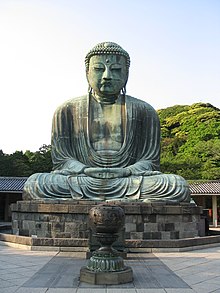Our website is made possible by displaying online advertisements to our visitors.
Please consider supporting us by disabling your ad blocker.
Portal:Religion
The Religion Portal
Religion is a range of social-cultural systems, including designated behaviors and practices, morals, beliefs, worldviews, texts, sanctified places, prophecies, ethics, or organizations, that generally relate humanity to supernatural, transcendental, and spiritual elements—although there is no scholarly consensus over what precisely constitutes a religion. Different religions may or may not contain various elements ranging from the divine, sacredness, faith, and a supernatural being or beings. (Full article...)
 Vital article
Vital article

Buddhism (/ˈbʊdɪzəm/ BUUD-ih-zəm, US also /ˈbuːd-/ BOOD-), also known as Buddha Dharma, is an Indian religion and philosophical tradition based on teachings attributed to the Buddha, a wandering teacher who lived in the 6th or 5th century BCE. It is the world's fourth-largest religion, with over 520 million followers, known as Buddhists, who comprise seven percent of the global population. It arose in the eastern Gangetic plain as a śramaṇa movement in the 5th century BCE, and gradually spread throughout much of Asia. Buddhism has subsequently played a major role in Asian culture and spirituality, eventually spreading to the West in the 20th century. (Full article...)
 Did you know (auto-generated)
Did you know (auto-generated)
- ... that religious studies scholar C. Jouco Bleeker believed that religions are like acorns?
- ... that the capital of South Ossetia once had more Jews than Ossetians?
- ... that across his thirty-six collections, fashion designer Alexander McQueen contemplated religion, told fairy tales, and criticized the fashion industry?
- ... that Gherardo Gambelli, the incoming archbishop of Florence, served as a prison chaplain in Chad for over a decade?
- ... that Catherine de Parthenay, a 16th-century Huguenot leader, was a member of "a highly successful network of information" during the French Wars of Religion?
- ... that a religious community is a group of people who practice the same religion, but do not have to live together?

Guy Fawkes Night, also known as Guy Fawkes Day, Bonfire Night and Fireworks Night, is an annual commemoration observed on 5 November, primarily in Great Britain, involving bonfires and fireworks displays. Its history begins with the events of 5 November 1605 O.S., when Guy Fawkes, a member of the Gunpowder Plot, was arrested while guarding explosives the plotters had placed beneath the House of Lords. The Catholic plotters had intended to assassinate Protestant king James I and his parliament. Celebrating that the king had survived, people lit bonfires around London. Months later, the Observance of 5th November Act mandated an annual public day of thanksgiving for the plot's failure. (Full article...)
Top 10 WikiProject Religion Popular articles of the month
 Subcategories
Subcategories
Topics
 Get involved
Get involved
Previous Page Next Page




































































